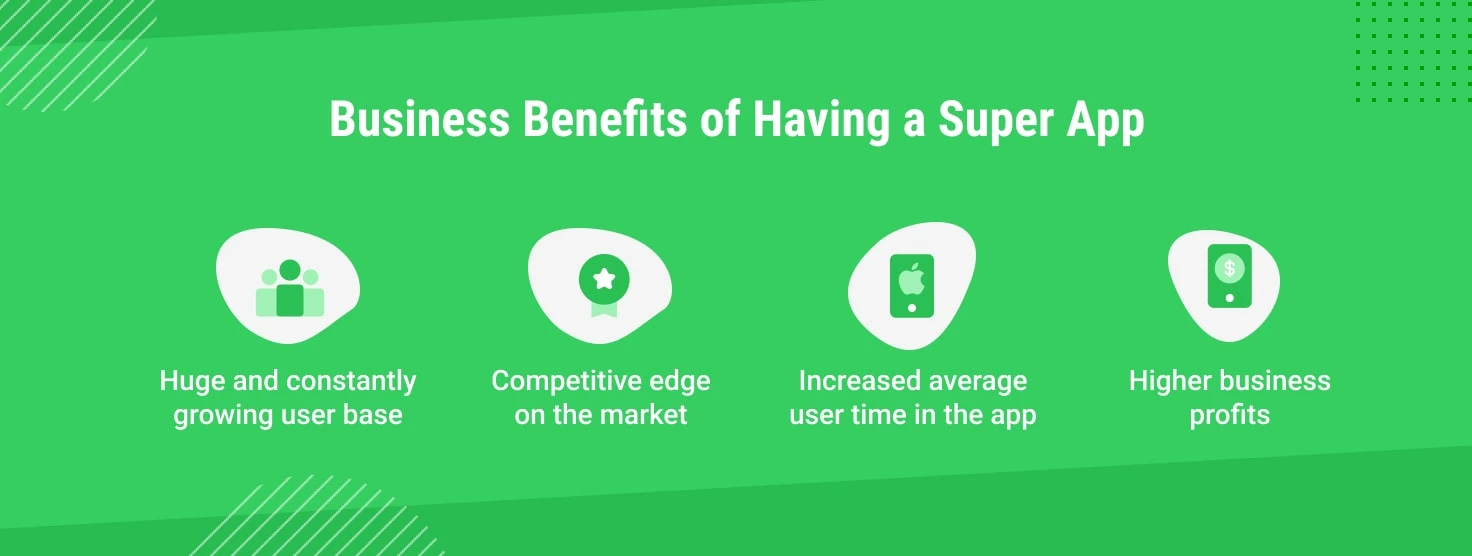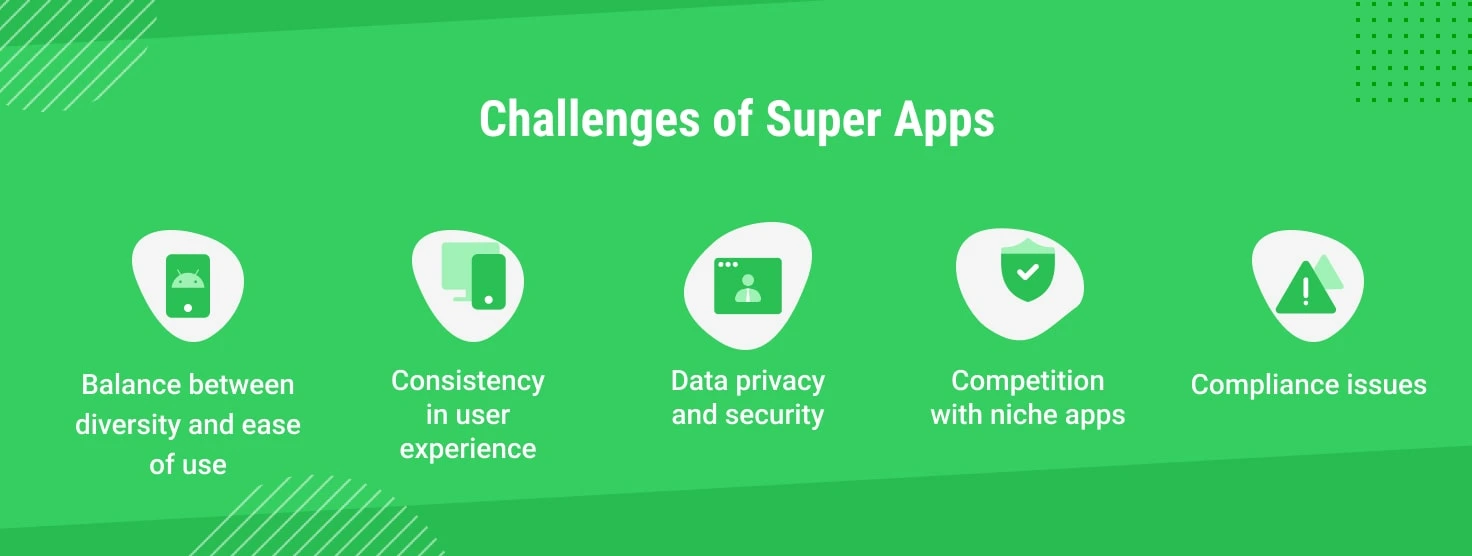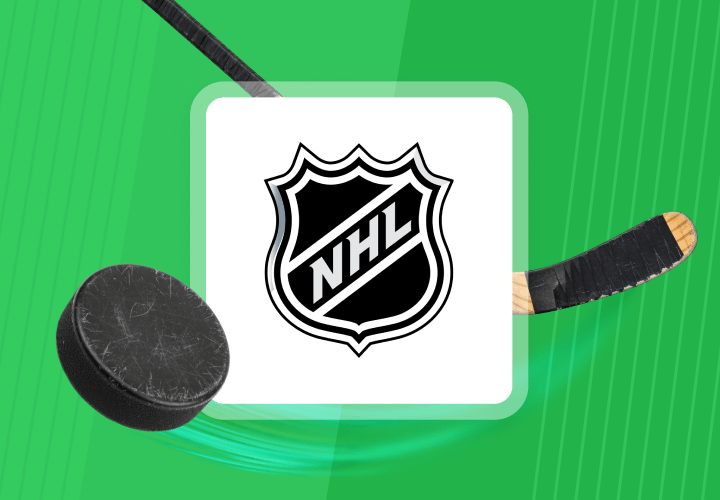The New Wave in Digitalization of Healthcare: Going From Niche to Super App
Table of contents
- How Can the Concept of a Super App Benefit Digital Healthcare Solution Providers?
- What Are the Challenges a Digital Healthcare Super App Can Face?
- 5 Features That Can Turn Your Narrow Niche App into a Super App
- Open architecture
- Personalization features
- Social features
- E-commerce features
- Financial features
- Developing a Super App from Scratch or Transforming Your Narrow Niche Digital Healthcare Solution: Which Option to Choose?
In the modern digital world, healthcare facilities rely on technology to become more efficient, offer superior patient care, and increase revenue. Research by PYMNTS on "Healthcare in the Digital Age" found that most consumers want to use a unified digital platform to handle their insurance benefits and other healthcare needs, signifying that the key to better medical care looks to be in solutions that store all necessary information and offer all services in one place. And this is where "super apps" come into play.
If you’re curious to know what is a super app, see how it can benefit a healthcare business, and find out the ways in which your niche app can be transformed into a super app, this article is an excellent place to start looking for answers.
How Can the Concept of a Super App Benefit Digital Healthcare Solution Providers?
The idea behind the phrase "super app" has more potential than just being another tech buzzword. The point is that when people have too many apps, neither they nor the product teams come out on top. According to a Simform post on app usage statistics in 2022, the average user typically has 40 apps on their phone, yet they only regularly use 18. The limited amount of time people want to spend navigating between services offered in these apps is a requirement that needs to be adequately addressed, and super apps are capable of doing it.
But in addition to benefiting end-users, super apps also bring a lot of benefits to business owners.

Huge and constantly growing user base
The attraction to super apps is similar to that of a shopping mall: people can purchase all the necessary items in one place. For example, WeChat, a Chinese tech giant, blended the features of a messaging service and a social media platform at its onset in 2011. Still, over the years, it has developed to encompass functions ranging from ride-sharing to e-commerce and even governmental services. Now, thanks to that, WeChat has almost 1.3 billion users.
Competitive edge on the market
Currently, the Western world has very few equivalents to such solutions as WeChat in any sector, particularly healthcare. This provides a remarkable opportunity for healthcare providers to become frontrunners in this niche and obtain the advantages of increased recognition and brand acknowledgment without intense competition.
Increased average user time in the app
Super apps have become increasingly popular due to them resolving customer pain points and addressing their needs. With a super app, customers no longer have to toggle between multiple apps for various purposes or download a new one for just one thing. At the same time, in terms of business opportunities, these solutions give a chance to companies to keep users spending more time within their apps.
Higher business profits
The PYMNTS survey showed that 79% of those surveyed prefer one digital platform for their medical expenses, and more than half (57%) desire a unified payment platform. This is consistent with the idea of a super app: the multitude of options in super apps drives customers to engage more with the product and pay more for its convenience.
What Are the Challenges a Digital Healthcare Super App Can Face?
The super app niche in the healthcare industry is undoubtedly a very attractive and prospective one. Nevertheless, if you consider entering this market, it’s important to ensure you address the existing challenges.

Balance between diversity and ease of use
It can be difficult to achieve the perfect blend of diversity and simplicity in super apps as they offer an array of services that can often make them intricate and hard to navigate.
Consistency in user experience
UX has to be consistent over all the features presented within a super app. However, this can be complicated as certain services may necessitate different designs and functionality.
Data privacy and security
Because super apps gather and manage substantial amounts of personal data, data security and privacy must be a priority, especially in the healthcare industry dealing with personal, sensitive information. You’ll have to ensure that practices for data collection are transparent to your users and that their data is well protected.
Competition with niche apps
There is also a potential to experience significant competition from niche apps that deliver specific services, as they could be in an advantageous position regarding user experience and functionality.
Compliance issues
Lastly, regulatory matters could arise as super apps span over numerous industries and can be subjected to various regulations in multiple markets.
5 Features That Can Turn Your Narrow Niche App into a Super App
Developing an effective super app requires recognizing which key features will most effectively tackle the most prevalent customer issues. So when designing a super app, your primary aim should be maximizing user engagement. And here are some features that will aid you in that endeavor.
Open architecture
It's no secret that in the healthcare sector, both patients and doctors benefit greatly from such features as data storage and sharing. A healthcare super app should allow users to collect all their medical records in a single repository and subsequently share them with their doctors. So open architecture proves essential as the patchwork of isolated solutions keeps important health data isolated in "black boxes" owned by vendors. It explains why patients are continually asked to complete personal information forms when they visit the doctor and why data stored by primary care providers cannot easily be transferred to urgent care centers.
Personalization features
Unlocking personalization is an essential element for a super app operating in healthcare. It works similarly to how Amazon customizes a shopping list, and Netflix suggests TV shows. Health consumers must be given a personalized experience with such features as medication reminders, exercise incentives, and resources adapted to their health condition.
The thing is that existing healthcare databases are packed with beneficial but useless information. Open architecture will simplify bringing together, assessing, and creating reports from data sourced from EMRs, CRMs, and wearable gadgets, etc. This enables organizations to sift through the pertinent details and acquire valuable intelligence that will direct consumers in making the ideal decisions for their well-being and maintain engagement during the care cycle.
Social features
Social media features provide a ground for users to communicate and interact, and healthcare super apps can also introduce features like chat, audio/video calls, groups, and feeds to build a loyal community inside their app. The so-called "stickiness" or user loyalty and engagement can be increased with a flourishing digital community. Users share content they can relate to and gradually expand their connections with like-minded people. The concept of communities works because people yearn for social interaction. Giving them a platform to make themselves heard shows that you respect their feelings and opinions.
E-commerce features
Online shopping became increasingly popular during the 2020 coronavirus pandemic, as the restrictions on in-person activities limited physical store visits. Consequently, several brands had to pivot their business models to stay afloat.
Now that more and more people are switching to digital services, this trend will likely remain in the foreseeable future. According to research, retail E-commerce sales will increase by 8% by 2024, and incorporating the necessary tools in your app can help you provide users with the shopping experience they seek.
Financial features
Banks know that having a hassle-free mobile payment experience is critical for customer retention, and so should your healthcare business. You can include plain payment options or go a step further and stand out from the rest with features like chatbots and digital wallets. Through this, your users will gain the convenience of managing finances on the go, whether it be transferring money, purchasing insurance or paying for a medical appointment from their mobile devices.
Developing a Super App from Scratch or Transforming Your Narrow Niche Digital Healthcare Solution: Which Option to Choose?
As you can understand, super apps need to focus on accessibility, utility, and the intangibles of a customer experience that create real, meaningful value. User-friendly designs and solutions that go beyond the surface to target customer pain points will encourage loyalty and build a foundation for success.
So let’s say you are ready to enter the super app health market. What are the options to consider?
Firstly, you can opt to create an in-house solution or hire a dedicated team to build everything from scratch. However, you should note that it will take approximately two years to produce a viable product - considering the onboarding process in the case that you hire an in-house team and the three to six months necessary to create an MVP.
Alternatively, if you have an existing healthcare solution, it's possible to rebuild it. And there are three primary ways to do it:
- Your existing solutions can be repurposed, where software components can be reused, and new codes can fill in the gaps. In some cases, such an approach can accelerate the development. But you also have to consider the risk of the product being unstable.
- Alternatively, integrating various APIs from external providers can reduce development time. You should note, however, that even though this approach is practical for a few APIs, the feasibility decreases as the number of integrations increases. Customization of third-party solutions is always a bit risky. For example, the solution may not be very flexible, so when it grows, it's possible that it may stop working under changed requirements.
Regardless of the path you decide to take, our cooperation on super app development can break down consumer barriers and allow you to recognize and understand the social determinants of health to achieve health equity. Emerline is here to help, whether you are creating something entirely new or optimizing what you already have. With a successful history of providing healthcare solutions, our professionals can alleviate your business issues with efficiency and affordability.
Our expertise allows us to address all the health super apps market challenges, including the most tricky and painful points, such as security.
It's no secret that any digital healthcare solution must be HIPAA-compliant. To ensure compliance, we do the following:
- Assignment of roles per the real needs of the user in terms of access to personal data
- Logging user actions
- Two-factor authorization to access the application
- Informing users about how their data is stored and used
- Encryption and decryption of data on the server before being sent to the server
- Access to data is carried out through unique keys, which contain information about who is requesting and whether they have access rights
Reach out to us for a free consultation so that our team can evaluate any existing systems you have and devise a plan to convert them into a super app. We'll provide you with a price and time estimate, so you can decide if cooperation with Emerline will work for you.
Published on Jul 1, 2023





